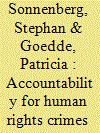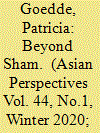| Srl | Item |
| 1 |
ID:
192960


|
|
|
|
|
| Summary/Abstract |
This article explores how claims alleging serious human rights violations or breaches of international criminal law that occurred in the Democratic People's Republic of Korea (DPRK or North Korea) might unfold in the courts of the Republic of Korea (ROK or South Korea) under various differing jurisdictional theories. South Korea has legislation allowing for the exercise of universal jurisdiction, an increasingly widespread judicial mechanism for a national court to hold alleged perpetrators of serious human rights and humanitarian law violations accountable for their actions regardless of where the crime was committed and regardless of the victim's or the perpetrator's nationality. In South Korea, domestic criminal and civil jurisdiction can conceivably be "stretched" to encompass crimes perpetrated on the northern half of the Korean peninsula due to a constitutional provision that denies the existence of a separate North Korean sovereign nation. This article introduces and compares the feasibility and challenges of various jurisdictional approaches in South Korea that could address human rights crimes in North Korea, specifically (a) universal jurisdiction prosecution based on domestic law, (b) domestic criminal prosecution, and (c) civil cases in tort.
|
|
|
|
|
|
|
|
|
|
|
|
|
|
|
|
| 2 |
ID:
171000


|
|
|
|
|
| Summary/Abstract |
The Constitution of the Democratic People's Republic of Korea is often dismissed as a valid legal instrument within the larger framework of the North Korean legal system. This is an unsurprising outcome given the portrayal of North Korea as a totalitarian dictatorship, documented human rights abuses, and the lack of access to the country's lawmaking processes. It is also a foreseeable result if comparisons are made to liberal democratic constitutions where rights guarantees and judicial review are defining elements. However, the North Korean Constitution deserves more nuanced scrutiny in light of evolving research on socialist and authoritarian constitutionalism in Asia. This article argues that the DPRK Constitution should be included more substantively within the analytical frameworks of Asian, socialist, and authoritarian constitutionalism by virtue of how it functions to nation-build, legitimate institutional leadership, signal ideological shifts, regulate society on collectivist, duty-based principles, and guide economic reforms for development and modernization.
|
|
|
|
|
|
|
|
|
|
|
|
|
|
|
|